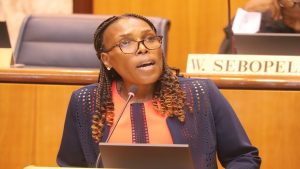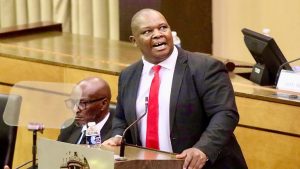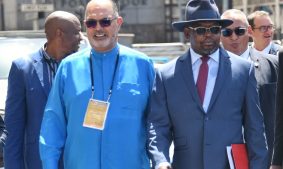Former Director of National Treasury Michael Sachs has warned that South Africa will still have high debt-servicing costs beyond 2023.
Sachs was speaking at a business webinar hosted by Deloitte Africa earlier on Thursday.
In his Budget Speech last month, Finance Minister Tito Mboweni projected that debt servicing costs for the country will come down over the medium term.
Finance Minister Tito Mboweni tables the Budget:
However, Sachs says this is unlikely. He argues that despite serious fiscal consolidation efforts over the next three years, South Africa will still be left with 6% of the Gross Domestic Product (GDP) going towards debt servicing costs after 2023.
“So, while we are on the path to consolidation – a very strong consolidation – we will still end the medium term with the biggest deficit we’ve had since the transition to democracy. So, there will still be more work to do to consolidate the debt after 2023. The reason for this can be seen in the structure of this deficit. The amount we are borrowing, simply to pay the interest of the previous borrowing, has been growing rapidly.”
Higher interest rates
Sachs says SA is paying very high-interest rates on their debts compared to other emerging economies. The government will need to improve the country’s budget balance by four percentage points of GDP if it is to stabilise the debt.
“There are variables that drive the debt part. It’s the interest rate of our debt, the growth of our economy. So, once things have returned to normal, what is the IMF’s expectation of growth and you can see South Africa’s growth rate is the lowest of any of the countries that the IMF projected in January. So, we have this combination of very high-interest rates and very low growth. And when you’re in this position, if you run a primary balance, debt to GDP ratio will continue to rise.”
Social grants will be affected
Sachs believes that social grants will take a knock as a result of the fiscal consolidation implemented by the Finance Minister last week. This is the largest fiscal consolidation on the expenditure side. He says there will be real erosion in the value of grants in the next three years, adding that the budget for courts, basic education, teachers, security, and child grant for example will be impacted.
“Lack of grant increases will worsen child hunger and at the same time, we are facing significant increases in unemployment and the old age grant was not given an inflation-related increase this year and it was given 1.6% and going forward for the next three years a 2.5% increase will be substantially below inflation. The same can be said about healthcare. The broader health system in which the poor depend, such as central hospitals, like Steve Biko and emergency services are all going far below the rate of inflation.”
‘2021 budget anti-poor’
The Budget Justice Coalition has called for the 2021 national budget presented by Finance Minister Tito Mboweni last month to be rejected. They say it is anti-poor and will deepen inequality, and undermining human rights. It wants the government to fund public social services instead of cutting funds.
“The National Treasury acknowledges that the cuts to the budget and I quote ‘will reduce the number of available teachers, this coupled with the number of raising learners and place larger class sizes, especially in fee-paying schools which are expected to affect learning outcomes’ close quote.
“So to put it forward, this budget will deeply undermine human rights in South Africa and also deepen the inequality that we already seeing,” says the Co-chair of the coalition Busi Sibeko.






